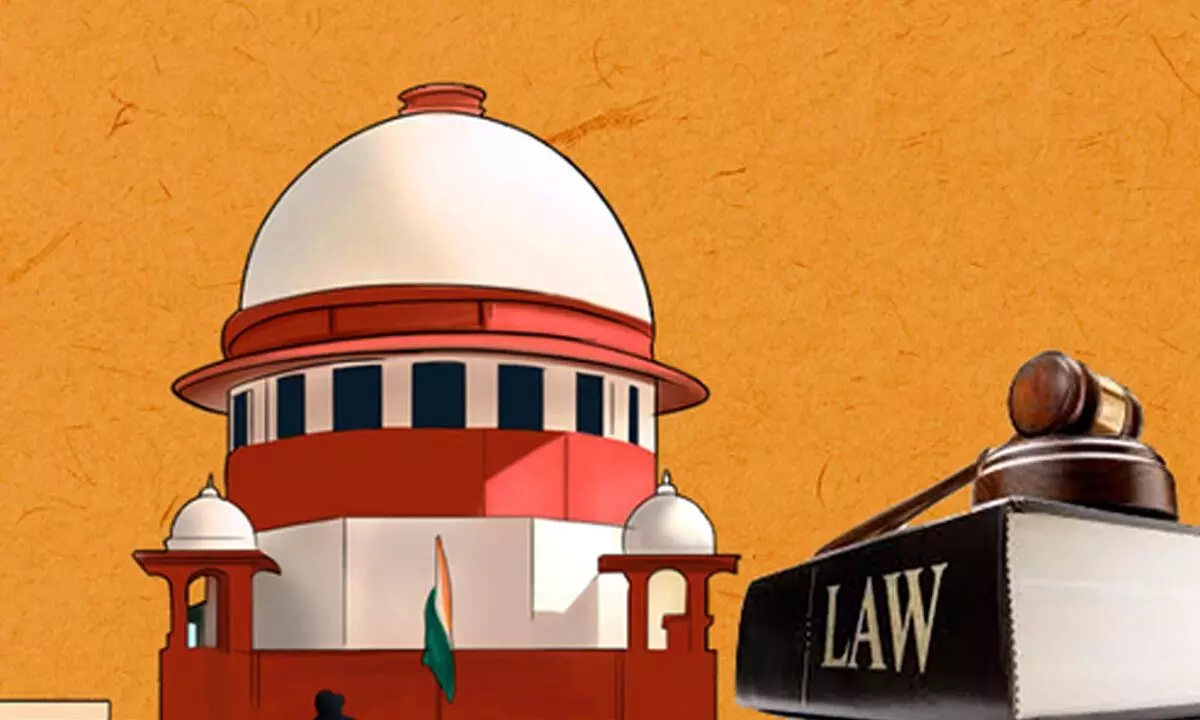Live
- Global prevalence of atopic dermatitis to reach 42.42 mn by 2033: Report
- OpenAI's GPT 5 Faces Delays Amid Data and Financial Challenges
- Sunny Leone's Name Used in Fraud Under Chhattisgarh’s Mahtari Vandan Yojana
- Gold Business Fraud Uncovered in Atmakur, Wanaparthy
- Rachakonda Police Seize Rs.88 Crore Worth Drugs, Arrest 521 Accused
- Sriram Krishnan Appointed Senior Policy Advisor for AI at the White House
- Cyclone alert at seven ports in Tamil Nadu; rain, strong winds expected
- Uttarakhand CM to attend MP govt's 'Jan Kalyan Parv' in Sagar today
- Sri Jagdamba Pearls Expands Presence with the launch of its Second Store in Bengaluru at Lulu Mall
- Congress remembers Dalits only in bad times: Mayawati taunts Rahul Gandhi on Parbhani visit
Just In
Same-sex marriage: Retired judges appreciate Supreme Court verdict for 'representing Indian traditions'

Supreme Court of India
A group of 22 former High Court Judges appreciated the Supreme Court verdict on same-sex marriage in a letter dated October 19.
New Delhi: A group of 22 former High Court Judges appreciated the Supreme Court verdict on same-sex marriage in a letter dated October 19.
"We are a group of former judges, the conscientious and concerned citizens of India appreciate the Supreme Court verdict on same-sex relation delivered on 17 October 2023 has received overwhelming applaud from the society except the LGBTQ+ community and minuscule section thereof."
The letter called the judgement a blend of interpretation of statutory provisions, culture and morality.
"It is relevant in the context of Indian culture, ethos, and heritage. Honourable Supreme Court has unanimously ruled that right to marriage is not a fundamental right. On the question of same-sex marriage, the court has again unanimously held that marriage being not a fundamental right, such a right can only be conferred and regulated by the statute enacted by appropriate legislative body (the subject being in concurrent list), both Parliament and state assembly are competent to legislate." the letter said.
The letter said that it also convincingly ruled that it is not within the jurisdiction of the court to make provisions for recognising such marriages either by interpreting or down reading the existing statutes (in particular reference to (The Special Marriage Act 1954) and it is within the domain of Parliament? Hon’ble Court has reconfirmed the well settled principle of separation of power enshrined in the constitution holding that the jurisdiction of the court is to interpret the constitutional/statutory provisions, and not to venture into legislative domain, which solely vests with the competent legislature.
On the minority judgements delivered by CJI DY Chandrachud and Justice Kaul, the letter said: "Thrust of minority view on equality, individual dignity, choice of civil union irrespective of sexual orientation and privacy emanating from Articles 19, 21 and 25 of constitution of India did not find favour with the majority in the bench."
The judges in the appreciation letter further said that an important feature of the majority view is recognition of the marriage as a social institution in existence from times immemorial, pre-dating the concept of state. This gives credence to the bond of marriage between a man and a woman constituting family as a primary unit.
The letter also praised the judgement for not recognising adoption rights for Queers.
"Queers right to adoption has also not been recognised by the Apex Court and rightly so. Even existing statutory provisions also restrict the rights of single person to adopt e.g. under the section 57 of The Juvenile Justice (care and protection of children) Act 2015, a single male is prohibited to adopt a female child." the letter read.
The letter concluded by appreciating the majority judgement for representing Indian traditions.
"Notwithstanding the debate, unanimity in some areas and differing views on other issues, the judgement particularly the majority view representing Indian traditions and belles-letter deserves all appreciation."
On October 17, the apex court delivered four verdicts in the same-sex marriage case.
The four judgments were written by CJI DY Chandrachud, Justice SK Kaul, Justice Ravindra Bhat, and Justice PS Narasimha respectively.
All five judges unanimously agreed that the right to marry is not a fundamental right.
Out of the five judges on the Constitution Bench, the majority verdicts delivered by three judges, Justice Ravindra Bhat, Justice Hima Kohli, and Justice PS Narasimha held that civil unions between same-sex couples are not recognised under law and they cannot claim the right to adopt children either.
In two separate minority judgments, CJI DY Chandrachud and Justice Kaul ruled that same-sex couples are entitled to recognise their relationships as civil unions and can claim consequential benefits.
Both the judges held that such couples have the right to adopt children and struck down Central Adoption Resource Authority (CARA) regulations to enable the same.
However, Justice Bhat maintained that CARA regulations were in fact not void for not allowing queer couples to adopt. Justice Kohli concurred with Justice Bhat. Justice Narasimha agreed with Justice Bhat's view and stated that CARA Regulations could not be held unconstitutional.

© 2024 Hyderabad Media House Limited/The Hans India. All rights reserved. Powered by hocalwire.com






